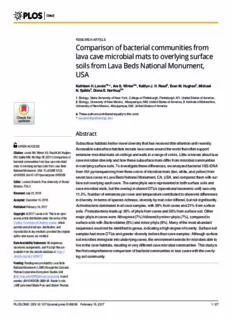
Comparison of bacterial communities from lava cave microbial mats to overlying surface soils from PDF
Preview Comparison of bacterial communities from lava cave microbial mats to overlying surface soils from
RESEARCHARTICLE Comparison of bacterial communities from lava cave microbial mats to overlying surface soils from Lava Beds National Monument, USA KathleenH.Lavoie1☯*,AraS.Winter2☯,KaitlynJ.H.Read2,EvanM.Hughes2,Michael N.Spilde3,DianaE.Northup2☯ 1 Biology,StateUniversityofNewYork,CollegeatPlattsburgh,Plattsburgh,NY,UnitedStatesofAmerica, 2 Biology,UniversityofNewMexico,Albuquerque,NM,UnitedStatesofAmerica,3 InstituteofMeteoritics, a1111111111 UniversityofNewMexico,Albuquerque,NM,UnitedStatesofAmerica a1111111111 a1111111111 ☯Theseauthorscontributedequallytothiswork. a1111111111 *[email protected] a1111111111 Abstract Subsurfacehabitatsharbornoveldiversitythathasreceivedlittleattentionuntilrecently. OPENACCESS Accessiblesubsurfacehabitatsincludelavacavesaroundtheworldthatoftensupport Citation:LavoieKH,WinterAS,ReadKJH,Hughes extensivemicrobialmatsonceilingsandwallsinarangeofcolors.Littleisknownaboutlava EM,SpildeMN,NorthupDE(2017)Comparisonof cavemicrobialdiversityandhowthesesubsurfacematsdifferfrommicrobialcommunities bacterialcommunitiesfromlavacavemicrobial matstooverlyingsurfacesoilsfromLavaBeds inoverlyingsurfacesoils.Toinvestigatethesedifferences,weanalyzedbacterial16SrDNA NationalMonument,USA.PLoSONE12(2): from454pyrosequencingfromthreecolorsofmicrobialmats(tan,white,andyellow)from e0169339.doi:10.1371/journal.pone.0169339 sevenlavacavesinLavaBedsNationalMonument,CA,USA,andcomparedthemwithsur- Editor:LorenzoBrusetti,FreeUniversityofBozen/ facesoiloverlyingeachcave.Thesamephylawererepresentedinbothsurfacesoilsand Bolzano,ITALY cavemicrobialmats,buttheoverlapinsharedOTUs(operationaltaxonomicunit)wasonly Received:July23,2016 11.2%.Numberofentrancespercaveandtemperaturecontributedtoobserveddifferences Accepted:December15,2016 indiversity.Intermsofspeciesrichness,diversitybymatcolordiffered,butnotsignificantly. Actinobacteriadominatedinallcavesamples,with39%fromcavesand21%fromsurface Published:February15,2017 soils.Proteobacteriamadeup30%ofphylafromcavesand36%fromsurfacesoil.Other Copyright:©2017Lavoieetal.Thisisanopen majorphylaincaveswereNitrospirae(7%)followedbyminorphyla(7%),comparedto accessarticledistributedunderthetermsofthe CreativeCommonsAttributionLicense,which surfacesoilswithBacteroidetes(8%)andminorphyla(8%).Manyofthemostabundant permitsunrestricteduse,distribution,and sequencescouldnotbeidentifiedtogenus,indicatingahighdegreeofnovelty.Surfacesoil reproductioninanymedium,providedtheoriginal sampleshadmoreOTUsandgreaterdiversityindicesthancavesamples.Althoughsurface authorandsourcearecredited. soilmicrobesimmigrateintounderlyingcaves,theenvironmentselectsformicrobesableto DataAvailabilityStatement:Allsequences, liveinthecavehabitats,resultinginverydifferentcavemicrobialcommunities.Thisstudyis taxonomicassignments,andRscriptfilesare thefirstcomprehensivecomparisonofbacterialcommunitiesinlavacaveswiththeoverly- availablefromthezenododatabaseat:https:// zenodo.org/record/58072. ingsoilcommunity. Funding:FundingwasprovidedbyLavaBeds NationalMonument(LABE)throughtheColorado PlateauCooperativeEcosystemStudiesUnit (http://nau.edu/CEFNS/Forestry/cpcesu/),Award numberJ8410100028-UNM-56.Funder’srole: LABEpersonnelShaneFryerandShawnThomas PLOSONE|DOI:10.1371/journal.pone.0169339 February15,2017 1/27 Surfacevs.lavacavebacterialmatcommunities helpedintheselectionofstudysites,supplied Introduction metadataforallsites,andassistedwithfieldwork. MostlifeonEarthintheaphoticsubsurfaceismicrobial[1],butthereismuchthatwedonot CompetingInterests:Theauthorshavedeclared yetknowaboutsubsurfacelife.Cavescanprovideanaturalwaytoaccesssubsurfaceenviron- thatnocompetinginterestsexist. mentsrangingfromverydeeplimestonecaves(KruberaCaveintheWesternCaucasusis morethan2,190mdeep[2]),toshallowcaves,suchaslavacavesthathaveanoverburdenof upto10m[3].DiscoveryofextensivelavaflowsandlavacavesonMars[4]supportsthecon- ceptthatEarth’slavacavesmayserveasamodelforthestudyoflifeonotherplanets(astrobi- ology)[5,6,7]. Lavacaves,formedduringactivelavaflows,containdiversemicrobialmatsthatrangefrom extensivematscoveringwallsandceilingstosmall,scatteredcolonies(Fig1andFig2).Matcolors includewhite,yellow,tan,gold,orange,andpink,withshadesinbetween[7–11].Despitetheir extensivenature,littleisknownaboutmicrobialmatdiversity(reviewedin[11,12]).Studiesof microbialdiversity[7–15]inlavacaveslagbehindsuchstudiesinkarstcaves.StonerandHowarth [16]firstdescribedthematsor“slimes”inHawaiianlavacavesusingculture-dependentmethods forisolationofchemoheterotrophicmicroorganismsandreportedonthepresenceoffungiand aerobicbacteria.Theysuggestedthatwhiteandbrownslimesmightbeimportantsitesfornutrient cyclingincaves,particularlynitrogen. Lavacavesareextremeenvironments,simplifiedbythelackofphotosynthesisinthedeep ordarkzoneofthecave,resultinginextremelyoligotrophicconditions.Thesimplifiednature ofcavesmakesthemamodelnaturallaboratorytostudyfactorscontrollingbiologicaldiversi- fication[17,18].Theisolationofmostcaveslimitstheabilityoforganismstomigrate,resulting inhighlevelsofendemismamongtroglobiontsandstygobiontsasthenorm[19].Culveretal. [20]foundthatabout30%ofcave-adaptedinvertebratespeciesinU.S.cavesarefoundinonly asinglecave.TheresultsofHathawayetal.[21]showthatthetrendcanbeextendedtobacte- rialdiversityinAzoreanandHawaiianlavacavemicrobialmats.Theauthorswerefarfrom samplingtotaldiversity,butlessthan5%oftheOTUs(operationaltaxonomicunit)foundin lavacavesoccurinothercavesorinothervolcanicenvironments.Sequencesweremorelikely toberelatedtosamplesfromthesamecaveorthesameislandthanbetweenislands.Ifmicro- bialdistributionisubiquitous,thentheywouldexpectahigherpercentageofsharedOTUs betweenthetwoislandarchipelagos. Biospeleologistsoriginallythoughtthatcavemicrobesweresimplyasubsetofsurfacemicrobes washedintounderlyingcaves[22,23].Ortizetal.[24,25]recentlypublishedwhatwebelievetobe thefirstcomparisonsofcavemicrobialdiversitywiththeoverlyingsoilmicrobialcommunity. Theirstudiesfocusedonbacterialdiversityacrosscarbonatespeleothemsurfacessampledby swabbingfromakarstcave,KartchnerCaverninArizona.Comparisonofbacterialtaxonomic profilestosurfacesoilsamplesrevealedmajordifferencesandonlya16%overlapbetweencave speleothemandsurfacesoilOTUs[24]. Ourstudyisthefirstandmostcomprehensivetocomparelavacavebacterialmatcommu- nitiestobacterialcommunitiesfromtheoverlyingsurfacesoilofeachcave.Weexamineda rangeofenvironmental,geographical,andchemicalfactorsthatmaycontributetobacterial diversityinmicrobialmatsofdifferentcolors(tan,white,andyellow)fromlavacavesinLava BedsNationalMonument,California,USA. Materialsandmethods Fieldstudiesethicsstatement AllsamplingwasdoneunderPermitLABE-2011-SCI-0007issuedtoNorthupbytheNational ParkService(LavaBedsNationalMonument,1IndianWellHeadquarters,POBox1240, PLOSONE|DOI:10.1371/journal.pone.0169339 February15,2017 2/27 Surfacevs.lavacavebacterialmatcommunities Fig1.Overviewofsomeofthelavacavesamplingsitesandcaves,plusaviewofthesurfaceterrain atLavaBedsNationalMonument,CA(LABE).(A)EntrancetoValentineCave.(B)Surfacesamplestaken aboveHopkinsChocolateCave.(C)YellowmicrobialmatsamplingsiteinValentineCave.(D)Extensive yellowmicrobialmatsonwallsofHopkinsChocolateCave.(E)PassageinValentineCaveshowingless microbialmatcoverageneartheentrance.(F)TanmicrobialmatsampletakeninL-V460Cave.Photos copyrightKennethIngham(A,D,E)andDianaNorthup(B,C,F). doi:10.1371/journal.pone.0169339.g001 Tulelake,CA96134).LavaBedsNationalMonumentisafederally-protectedareaunderthe NationalParkService,DepartmentoftheInterior.Noprotectedspeciesweresampled.Shawn Thomas,ShaneFryer,andJokeVansweevelthavegiventheirconsenttohavephotosofthem- selves,takenduringsamplingtrips,usedinthismanuscript. Samplingsites LavaBedsNationalMonument(LABE)islocatedinnorthernCaliforniaclosetotheborders ofOregonandNevada[26].TheMonumentcovers190km2ontheNEflankoftheMedicine LakeVolcano.Two-thirdsofthelavacamefromtheMammothandModoccratersoverthe PLOSONE|DOI:10.1371/journal.pone.0169339 February15,2017 3/27 Surfacevs.lavacavebacterialmatcommunities Fig2.Microbialmatandcolonymorphology.(A)Overviewofpredominantlyyellowandwhitemicrobial mats,someseparateandsomeintermixed.(B)Overviewoftanandwhitemicrobialmats.(C)Intermixedtan, white,andyellowmicrobialmats.Closeupsof(D)tanandwhitecolonymorphology,(E)tancolonies,and(F) yellowcolonies. doi:10.1371/journal.pone.0169339.g002 lasttwomillionplusyearsandasrecentlyas1,100yearsago.Flowsarelargelyofbasaltwith smalleramountsofsilica-richbasalticandesite[27]. LABEhasthelargestnumberoflavacavesinNorthAmerica,with778known[26]. Twenty-fiveofthelavacaveshavesignedentrancesanddevelopedtrailsforeaseofvisitation. Theareaisahigh-elevation(1219–1737mabovesealevel),semi-ariddesertwithaverage yearlyprecipitationof375mm.Temperaturerangesfromanaveragelowof-5.4˚CinJanuary toanaveragehighof22.3˚CinJulyandAugust.Someofthelavacavescontainperennialice [27]. WeworkedwithLABEpersonneltoselectsevenlavacavestocoverarangeofparameters (Table1):amountofhumanvisitation,ageofthelavaflow,surfacevegetation,elevation, PLOSONE|DOI:10.1371/journal.pone.0169339 February15,2017 4/27 Surfacevs.lavacavebacterialmatcommunities Table1. CharacteristicsofthesevenstudycavesitesinLABE. Cave SurfaceSoil Visitation LavaAge Surface Elevation #Entr Branches(Nodes) Length Catacombs C15 High 36,000±16,000 Sagebrush 1,524m 1 32 2571m GoldenDome GD25 High 36,000±16,000 Sagebrush 1,378m 2 7 679m GE-L350 GE13 Low 16,000 Sagebrush 1,506m 1 9 439m HopkinsChocolate(HCC) HC15 High 36,000±16,000 Sagebrush 1,506m 4 4 519m L-V460 L14 Low 12,260 Juniper 1,360m 2 5 700m S-L280 S10 Low 36,000±16,000 Sagebrush 1,372m 2 5 671m Valentine V16 High 12,260 Juniper 1,3768m 1 12 651m Cavenameorcodeforbackcountrycaves.Visitation=numberofvisitors,groupedintoHigh(opentothepublic)andLow(closedtovisitation).Lava Age=Ageoflavaflow.Surface=surfacevegetation,whereSagebrush=Bigsagebrush-antelopebitterbrushscrublandandJuniper=Juniper-mountain mahoganyscrubland.Elevationistheelevationinmattheentrancea.s.l.#Entr=numberofaccessibleorfunctionalentrancesintothecave.Branches (Nodes)isanindicationofthegeometriccomplexityofthecavebycountingthenumberofpassagebranchpoints.Lengthisthemappedlengthofthecave inm. doi:10.1371/journal.pone.0169339.t001 numberofentrances,branchingcomplexity,andmappedlengthofthecaveInadditiontothe cavesamples,asampleofsoiloverlyingeachcaveentrance(e.g.Fig1B)wascollectedforcom- parisonandphoto-documentedatthecollectionsite(Fig1F). Cavesamples(Table2)werecharacterizedbycolorofthemicrobialmats(tan,white,and yellowe.g.Fig2),distancefromthenearestentrance,temperature,humidity,andRH,andpH whensuitablewaterpoolsordrippingwaterwereavailablenearmats.Allsampleswerephoto- documentedatthecollectionsite Temperature,RH,andpHmeasurements Temperature(webbulbanddrybulbinordertoobtainanapproximateRH)wastakenin April,2011andinSeptember,2012withanIMCtemperatureprobe(http://www. imcinstruments.com/),whichwascalibratedatfrequentintervalsinthecavetoimproveaccu- racy.WetbulbreadingswereobtainedwiththeIMCprobesheathedwithwickingsoakedin deionizedwaterbeforeeachreading.ForsomeRHsamplesaportableKestrel3000wind meter(https://kestrelmeters.com/products/kestrel-3000-wind-meter)wasused,whichwascal- ibratedatthebeginningofeachcave.AJavascriptprogram(http://home.fuse.net/clymer/ water/wet.html)useddryandwetbulbtemperaturestoapproximaterelativehumidity.Read- ingsforpHweretakenwithaTwinCardypHmeter(SpectrumTechnologies,Inc.,http:// www.specmeters.com/nutrient-management/ph-and-ec-meters/ph/cardy-twin-ph-meter/), calibratedwithpH7buffer. SamplecollectionsforDNAandScanningElectronMicroscopy(SEM) SamplingtookplaceinApril2011withadditionalsampling(GEM2,HCC1,SC2)inAugust 2012toincreasethenumberofwhitematsamples.Yellow,white,andtanmatsweresampled fromeachcave.SamplesforDNAextractionwerecollectedasepticallywithaflame-sterilized coldchiselintoasterile50ccFalcontube.Soilsampleswerecollectedfromaboveeachcave entrancebyremovinganysurfaceplantdetritusandscoopingthetop2cmofsoilintoasterile 50ccFalcontube.AllsamplesforDNAwerecoveredwithinhourswithsucroselysisbuffer [28]toreleaseandstabilizetheDNA.AllsampleswerebroughttotheNorthupLabattheUni- versityofNewMexicoforfurtherprocessingandanalysiswithinsevendays.Wecollectedsur- facesoilsfromabovesevencaves,andhadsevensamplesofwhiteandtanmatsandnine samplesfromyellowmats,withatleastoneofeachcolorfromeachcave. PLOSONE|DOI:10.1371/journal.pone.0169339 February15,2017 5/27 Surfacevs.lavacavebacterialmatcommunities Table2. Cavesamplesbymatcolorandenvironmentalcharacteristicsinthecave. Cave Sample Color Distancefromentrance T˚C %RH pH Catacombs C1 T 51m 13.6 61 nd Catacombs C2 Y 51m 13.6 61 nd Catacombs C9 W 76m 15.7 45 nd GoldenDome GD1 Y 278m 9.3 99 8.13 GoldenDome GD2 T 276.5m 9.2 100 7.96 GoldenDome GD3 W 276.5m 9.2 100 7.96 GoldenDome GD16 Y 278m 9.3 99 8.13 GE-L350 GE1 T 64m 9.9 87 7.45 GE-L350 GE2 Y 64m 9.9 87 7.45 GE-L350 GEM2 W 67m 7.1 86.6 nd HCC HC1 Y 37m 11.5 89 nd HCC HC6 T 107m 8.9 100 7.98 HCC HC7 Y 107m 8.9 100 7.98 HCC HCC1 W 105m 8.9 100 7.97 L-V460 L1 Y 200m 9.3 96.3 7.31 L-V460 L3 W 200m 9.3 96.3 7.31 L-V460 L9 T 87m 9.8 92.7 nd S-L280 S2 Y 255m 16.1 82.1 nd S-L280 SC2 W 135m 16.1 82.1 nd S-L280 S4 T 145m 13.1 70.6 nd Valentine V1 Y 135m 11.2 100 7.45 Valentine V2 T 135m 11.2 100 7.45 Valentine V13 W 170m 11.3 100 7.75 C=Catacombs;GEandGEM=G-L350;GD=GoldenDome;HCandHCC=HopkinsChocolate;L=L-V460;SandSC=S-L280;andV=Valentine. Color:T=Tan,Y=Yellow,W=White.Distanceisthedistanceinmfromthenearestentrancetothesamplingsite.Temperature,RH,andpHdatawere collectedinApril2011andAug2012.(nd=notdetermined) doi:10.1371/journal.pone.0169339.t002 Samplesforscanningelectronmicroscopy(SEM)fromrockchipsweremounteddirectly ontoSEMstubswithsuperglueandplacedinacarryingcasefortransport.Amicrobialmat sample(L-V460-110425-6),consistingofchipsofthewallrockwithwhitetopaleyellowcolo- nies,wastakenapproximately200mintoCaveL-V460atthebottomofapillar.Oneofthe twoyellowmicrobialmatsamples(HC110423-5)analyzedwithSEMwasarockchipwithyel- lowcoloniesfromthefloorofHopkinsChocolateCave,approximately36mintothecave.The secondyellowmatsample(S-L280-110427-3)wastakenapproximately60mintoCaveS-L280 and1mabovethefloorand1mbelowtheceiling. Waterchemistryanalysis Samplesforchemicalanalysiswerepreservedwith6Nhydrochloricacidinthefield,as describedin[29].Amountsofchloride,nitrite,nitrate,phosphate,andsulfatewereanalyzed usingaDionexIonChromatographDX-100(Dionex,Sunnyvale,CA,USA)asdescribed[29]. Molecularphylogeny DNAextraction,sequencing,andsequenceanalysis. DNAwasextractedfromtriplicate samplesofrockchipswithmicrobialmatsfromeachcavebymatcolorandfromthesurface soilsamplesusingtheMoBioPowerSoilTMDNAextractionkitfollowingmanufacturer’s PLOSONE|DOI:10.1371/journal.pone.0169339 February15,2017 6/27 Surfacevs.lavacavebacterialmatcommunities protocolexceptweusedbeadbeatingratherthanvortexing,whichtheNorthupLabfindsto bemoreeffectiveatreleasingDNAfromGrampositivecells. PolymeraseChainReaction(PCR). PCRwasperformedtoverifythequalityandquan- tityoftheDNApriortosequencing.Onehundredtwentyfivetothreehundredngofpurified DNAwasusedtoamplifythe16SrRNAgenefromenvironmentalDNAbyPCRwithuniver- salprimers,p46forward(5’-GCYTAAYACATGCAAGTCG-3’)andp1409reverse(5’-GTG ACGGGRGTGGTGTRCAA-3’;[30]andAmpliTaqLD(AppliedBiosystems)withanMJther- malcyclerusing:4mindenaturationat94˚Cfollowedby35cyclesof45secannealingat55˚C, extensionfor2minat72˚C,denaturationfor30secat94˚C,withafinal45sec55˚Canda20 min72˚Cextensionstepaftercyclingwascomplete. Sequencingandphylogeneticanalysis. Sampleswereanalyzedwithnext-generation sequencingofthe16SSSUgenebacterialV1-3region(primer27F)usingRocheFLXandTita- nium454technologyconductedbyMRDNA,Shallowater,TX(http://www.mrdnalab.com/). All454datawereprocessedinQIIME1.9.1[31].Qualitycontrolandtrimmingofthe454 datasetweredoneusingthesplit_libraries.pycommandwithalowerlength(-l)of100bpand anupperlength(-L)of500.Aqualityscore(-s)of30waschosen.Removaloferroneous sequences(denoising)andOTUclusteringweredoneusingpick_de_novo_otus.pypipeline withthesumaclustoption[32].Thesumaclustalgorithmismainlyusefultodetectthe’errone- ous’sequencescreatedduringamplificationandsequencingprotocols.OTUswereclustered atthe97%similaritylevelusingsumaclust.Thepick_de_novocommandalsopickstherepre- sentativesetandassignstaxonomyusinguclust[33]againstthegreengenes13.8database[34]. Thepipelinealsoalignsandbuildsaphylogenetictreeusingpynast[35]andfasttree[36]from therepresentativesequenceset.ChimeracheckingwasdoneusingUSEARCHtodetectarti- factscreatedduringsequencing.Good’scoverageshowedthatweweresuccessfulingetting nearlyallofthediversityfromoursamples.Valuesrangedfrom99.11%to87.13%withan averagevalueof94.98%.Librarysizesrangedfrom471to4317.Rarefactioncurves(S1Fig) weregeneratedusingacustomfunctionwrittenbyBelaHausmann(https://github.com/ joey711/phyloseq/issues/143)andisalsoavailableinourzenodoarchive.Theseplotscompare estimatedtotalrichnesspersampleatagivendepth.Therarefactioncurvesarecalculatedwith observed(totalrichness),Shannon,Chao1andtheirassociateduncertainties. DiversitybyphylawiththeProteobacteriaseparatedoutbyclasswascomparedforallsam- ples.TheL2phyladatawerereducedtoeighteengroups,includingunassignedphylaanda groupwecalledminorphyla.Theminorphylaareentriesthathadlessthan1000OTUsacross allsamples.Ofatotalof140,848OTUs,26,609werefromthesurfacesamples,and38,214 fromtan,36,014fromwhite,and40,011fromyellowmats.TheprocesswasrepeatedattheL6 genuslevelresultinginninegroups,anunassignedgroup,andminorgenerawith471taxa. SequencessubmittedtotheNCBIGenBankdatabase(www.ncbi.nlm.nih.gov/genbank/) wereassignedAccessionNumbersJX694094-JX702544,andthethreeadditionalwhitesam- plesKP705489-KP706447. Statisticalanalysis Communitydissimilaritywasvisualizedusingthephyloseqpackage[37]andggplot2[38]inR [39].AlphadiversitywasanalyzedusingobservedOTUs,ShannonandChao1indicesinthe phyloseqpackage.Alphadiversitymeasureswerecarriedoutontherawdataasrecommended [37].Observedrichnesswillscalewithincreasinglibrarysize;howeverbothChao1andShan- nonarerobustmeasuresofrichnessanddiversity,whichaccountfordifferencesinlibrarysize (rarefactioncurvesinS1Fig).ObservedOTUsistherawnumberofOTUspresentineach sampleofqualitycontrolledandclusteredsequencesasdescribedabove.Betadiversitywas PLOSONE|DOI:10.1371/journal.pone.0169339 February15,2017 7/27 Surfacevs.lavacavebacterialmatcommunities analyzedusingnon-metricdimensionalscaling(NMDS)withtheBrays-Curtisdistanceusing theveganpackage[40]inR.TheBrays-Curtisdistancewaspickedbecauseitisinvariantto changesinunits,unaffectedbyadditionsandremovalofsamples,andNMDSrecognizesdif- ferencesintotalabundanceswhenrelativeabundancesaresimilar.Theordinationofthesam- pleswasdoneusingcustomRscriptsbyUmerZeeshanIjazavailableat:http://userweb.eng. gla.ac.uk/umer.ijaz/bioinformatics/ecological.html. DifferentialabundanceoftaxawascharacterizedusingtheDESeq2package[41]with parametersfitType=“local”.Anadjustedp-valuethresholdof0.1wasusedtocalculatelog2 foldchangesbetweensurfacesoilsandcavemicrobialmats. Phylogenetictreeanalysiswascarriedoutinthephyloseqpackage.Thedataweresubsetby phylathatweredifferentiallyabundantasdeterminedbyDeSeq2.Treefileswithtipslabel werewrittenoutusingwrite.tree(phy_tree(phyloseq_obj),file="phylum_name.newick").The tree,tiplabels,andtraits(caveorsurface)wereloadedintoInteractiveTreeofLifev3(http:// itol.embl.de/)[42]forvisualization.Traitswereassignedtothetreetipsasrelativeabundance oftheOTUspresentinthecave. Totalbacterialrichnessforcavesampleswastestedusingahierarchalgeneralizedmixed effectsmodelinRwiththestanarm[43]package.RichnessdatawerenormalizedinQIIME beforemodelingusingnormalize_table.py-ilavabeds.biom-aDESeq2-oDESeq2_normalize- d_otu_table.biom–DESeq_negatives_to_zero.Cave,colorofmat,visitation,andcavegeome- trywereassignedasrandomeffects(levelsofhierarchy).Thefollowingoptionswereusedwith stan_glmer:family=gaussian,dapt_delta=0.95,prior=normal(location=0,scale=8), seed=SEED,iter=50000,cores=6. Results Waterchemistry Chemicalanalysisofwatersamplescollectedfromeachcavewithavailablestandingwateris showninTable3.Chlorinelevelsaveraged(5.086ppm),slightlyhigherthantheEPAMaxi- mumContaminantLevelGoalsfordrinkingwaterof4ppm[44].EPAlevelsfornitrate (1ppm)andnitrate(10ppm)werenotexceededinmostcavewatersamples.Thereareno phosphatelevelstandardssetbytheEPA,butourcavesampleswerealllow.Sulfatewaterstan- dardsare250ppm,andourswereallverylow. Table3. WaterchemistryofcavewatersamplesfromLavaBedsNationalMonument. SeeTable1forthecavesampleabbreviations.Bromide(not shown)allbelowdetectionlimits. Cavesample Chloride(Clmg/L) Nitrite(NO mg/L) Nitrate(NO mg/L) Phosphate(PO mg/L) Sulfate(SO mg/L) 2 3 4 4 CAT7 12.571 nd 0.6039 nd 0.6103 CAT13 2.184 0.9866 0.5924 nd 0.3251 GD20 3.567 0.5526 0.7286 nd nd GE26 9.203 nd 0.8325 nd 0.4704 GE10 5.128 0.3320 0.9140 nd 0.4329 HC3 2.116 nd 0.6606 0.6715 0.5391 HC10 1.821 nd 1.5608 nd 1.1231 L-V460-4 4.493 0.5778 2.7485 0.5371 0.5851 L-V460-12 2.031 nd 0.7116 0.5571 0.5505 S-L280-6 3.702 0.4489 8.0036 0.4697 2.3381 VAL3 9.132 0.3113 0.5483 nd 0.5910 nd=notdetected doi:10.1371/journal.pone.0169339.t003 PLOSONE|DOI:10.1371/journal.pone.0169339 February15,2017 8/27 Surfacevs.lavacavebacterialmatcommunities Surfacesoilversuscavealphadiversity Measuresofalphadiversityamongsurfacesoilsamplesandcavesamplesbycolorofmat(Fig 3)showspeciesrichness(ObservedandChao1[45])andrelativeabundance(Shannonand Simpson’s).Simpsonislessinfluencedbysingletons(i.e.raretaxa)thanShannon’sIndex,but Shannon’sinlesssensitivetodifferenceinlibrarysize.Themeansareverydifferent,with muchgreaterbacterialdiversityinsoilthancave.Soilbacterialdiversityismoreevenlydistrib- utedamongOTUs.Cavesamplesarelessevenlydistributed,withawidedistributionofSimp- son’svalueswithmanyoutliersincontrasttosoilsamples.In-cavevariationismuchhigher thansurfacesoilvariation.Intermsofspeciesrichnessindifferentlycoloredmats,tansamples havehigherdiversity,followedbyyellowandthenwhite.IntermsofShannon’sandSimpson’s indices,thethreecolorsofmicrobialmatsarenotthatdifferent.Fig3showsthedifference betweencavemicrobialmatsandsurfacesoilsinrespecttototalrichnessofeachsample (observedOTUs)andShannonIndex.InallcasessurfacesoilshavemoreOTUsandhigher Shannonindicesindicatinghigherdiversity.Rarefactioncurvescompareestimatedtotalrich- nesspersampleatagivendepthandareincludedinthesupplementalinformation(S1Fig). Therarefactioncurvesshowalinearrelationshipbetweensamplingdepthandspeciesrich- ness.TheChao1estimatedrichnessandShannonleveloffafter1000and500,respectively. Taxonomybyphylumandproteobacteriaclass Compositionbythetopfivephylaandfourproteobacterialclasses,plusminorphylabasedon OTUs,arepresentedinFig4.Comparisonsofsurfacesoilsampleswiththeunderlyingcave samplesshowsomedifferences.MostnotableisthelowerpercentageofActinobacteriainsur- facesoilsamples(21%)versuscavesamples(39%),thereductionintheNitrospirae insurface (3%)vs.cavesamples(7%),andtheincreaseinAlphaproteobacteriainthesurfacesoilsamples (17%)comparedtothecavesamples(10%).Smaller,butsignificantdifferencesthatdecrease Fig3.Alphadiversityindices(richness,Chao1,andShannon).Boxplotsofsurfacesoilsandcavemicrobialmats bycolor.Surfacesoilsamplesareinblueandcavesamplesinred. doi:10.1371/journal.pone.0169339.g003 PLOSONE|DOI:10.1371/journal.pone.0169339 February15,2017 9/27 Surfacevs.lavacavebacterialmatcommunities Fig4.StaggeredbarchartofrelativeabundanceofOTUs.Majorandminorphylabyallcavesamplesandallsurfacesamples.Cavesampleshavea greaterrelativeabundanceofActinobacteriaandNitrospirae. doi:10.1371/journal.pone.0169339.g004 fromsurfacetocaveareseenwiththeBacteroidetes(surface8%andcave2%);Gemmatimona- detes(surface3%andcave<1%);andPlanctomycetes(surface2%andcave1%).TheGamma- proteobacteriaincreasebetweensurface(18%)andcave(20%),whileBetaproteobacteria(surface 4%andcave3%)andDeltaproteobacteria(surface4%andcave1%)bothdeclineincavesam- ples.Noneofthephyladifferedsignificantlybymatcolor.Somedifferenceswereobservedby matcolorintheActinobacteria(tan:37%,white:39%,yellow:44%),Gammaproteobacteria(tan: 19%,white:24%,yellow:20%),Nitrospirae (tan:11%,white:4%,yellow:7%),andBetaproteo- bacteria(tan:3%,white:6%,yellow:2%). Molecularphylogenybyfamilyorgenus ThepercentageofOTUsbygenusorfamilyispresentedinFig5forsurfacesoilandcavemat samples.Resultsfromtheanalysisofdiversitybygeneraareinterestinginseveralrespects. Firstofall,alargepercentageofOTUsarenovel.Oftheninemajorgenera,onlyfourareiden- tifiedtogenuslevel,fourtofamily,andonetoclass.Thereisalsoagroupcalledunassigned, whichcouldnotevenbeclassifiedtobacteria.TheseunassignedOTUsmayrepresentarchaeal DNAthatamplifiedwithourprimersormaybeorganismsthatareparticularlydifficultto classifythrough454sequencing,likemembersoftheVerrucomicrobia. Bergmannetal.[46] usedbarcodedpyrosequencingwithsurfaceandsubsurfacesoilstoreduceprimerbias,and foundthatVerrucomicrobia areubiquitousandwereoftenthedominantphylumintheirsam- ples.Inourstudy,noindividualVerrucomicrobia genusmetourcriteriaforinclusioninFig5. PLOSONE|DOI:10.1371/journal.pone.0169339 February15,2017 10/27
Description: